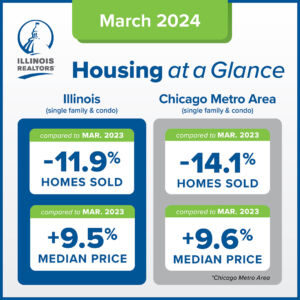Legal Case Studies: November 2019
Legal case studies this issue:
- Sellers in short sale were not entitled to difference in sale price between first contract that was breached and second lower price.
- Landlords in Hammond may be required to obtain a license or hire a licensed contractor to make repairs.
- Deed did not create joint tenancy because it conveyed unequal undivided interests.
- Strict construction of option to renew lease did not invalidate exercise with technical errors.
- Updates on previous legal case studies…
Research and analysis by Lisa Harms Hartzler,
Sorling Northrup Attorneys
Sellers in short sale were not entitled to difference in sale price between first contract that was breached and second lower price.
In Morse v. Donati, 2019 IL App (2d) 180328, the plaintiffs had defaulted on the mortgage on their home in Clarendon Hills. In lieu of foreclosing on the property, the bank agreed to a short sale, provided that it received all of the proceeds and plaintiffs received $0 at closing. Defendant agreed to purchase the plaintiffs’ home for $410,000 but refused to close. Plaintiffs then sold the property to another purchaser for $35,000 less than the defendant had agreed to pay. The bank agreed to this sale under the same terms. Plaintiffs sued the defendant for breach of contract and claimed the difference between the two contract prices as damages.
Defendant argued that the plaintiffs suffered no damages from his failure to close. The court agreed. It was the bank, not the plaintiffs, that suffered the difference between the balance of its loan to the plaintiffs and the sale price under both contracts. The plaintiffs received $0 from the second sale and were not obligated to pay anything more on their loan. Consequently, plaintiffs could prove no damages and were not entitled to recover the difference in the sales prices from the defendant.
Landlords in Hammond may be required to obtain a license or hire a licensed contractor to make repairs.
In Regan v. City of Hammond, Indiana, 934 F.3d 700 (7th Cir. 2019), the plaintiffs were an individual from Illinois and a real estate investor group who owned residential rental property in Hammond. The city’s ordinances required a residential property owner who wants to make repairs to hire a licensed contractor or obtain an individual license by submitting an application, passing a test and criminal background check, and paying a fee. A person making repairs or improvements to a private, single-family residence in which he resides is exempt from the license requirement. Plaintiffs sued the City of Hammond, claiming that the ordinance discriminates against interstate commerce in violation of the commerce clause in the U.S. Constitution.
The federal appeals court explained that, for purposes of commerce clause analysis, local laws are placed into one of three categories: (1) laws that expressly discriminate against interstate commerce; (2) laws that, although neutral on their face, bear more heavily on interstate than local commerce; and (3) laws that may have a mild effect on interstate commerce but in practice do not give local firms any competitive advantage over firms located elsewhere. The third category is analyzed under a “rational basis” standard.
The court decided that the Hammond ordinance fell into the third category because it drew no distinction between those who are domiciled in Hammond or elsewhere in Indiana and those who are not. “All landlords are subject to the license requirement.” Even though owner-occupants and landlords may at some point compete in the national market by selling their property, homeowners and landlords are not similarly situated during the term of their ownership because the homeowner does not derive rental income from his property. The owner-occupant also bears the consequences of repairs in a way a landlord does not. Consequently, the ordinance does not discriminate against non-Hammond property owners in a way that triggers a presumption of invalidity under the commerce clause.
For these same reasons, the court concluded that the city had a rational basis to support the ordinance. It has an obvious interest in the safety and habitability of the home in which residents live. The ordinance is a legitimate exercise of the city’s authority to promote that interest. The court held that summary judgment was properly granted in favor of the city.
Deed did not create joint tenancy because it conveyed unequal undivided interests.
In Jezewski v. Jaworski, 2019 IL App (1st) 170100, a deed conveyed property in Chicago as follows:
An undivided one half interest to Aniela Jezewski and an additional undivided one half interest to Kazmierz Jaworski and Elizabeth Jaworski as Joint Tenants and not tenants in common.
Aniela died in 2009 and a probate estate was opened. Her estate, the plaintiff in this case, filed a petition to partition the property. Kazmierz filed a motion to dismiss the petition, arguing that the estate had no interest in the property because the deed created a joint tenancy among all of the grantees. He claimed, therefore, that upon Aniela’s death, her interest passed directly to him and Elizabeth.
The Court held that the language in the deed was not ambiguous and clearly did not create a joint tenancy among Aniela, Kazmierz, and Elizabeth. One requirement to create a joint tenancy is that each person must receive an equal share of the property—they must have a unity of interests. In this case, Aniela originally received a one-half share and Kazmierz and Elizabeth each received a one-quarter share as joint tenants. The three individuals did not have equal shares and, therefore, owned the property as a whole as tenants in common. Aniela’s one-half share did not pass directly to Kazmierz and Elizabeth but remained in her estate, which was entitled to file a petition for partition.
Strict construction of option to renew lease did not invalidate exercise with technical errors.
In 900 North Rush LLC v. Intermix Holdco, Inc., 2019 IL App (1st) 181914, a Chicago commercial lease agreement contained a renewal option extending the term for five years. The option required tenant to notify landlord in writing within 120 days prior to the expiration of the initial term. The tenant, defendant Intermix Holdco, was a subsidiary of a parent company that also owned Gap, Inc. and Old Navy, LLC. An attorney for the tenant timely notified the landlord by written letter that the tenant was exercising the option. However, the letter was on Gap, Inc.’s letterhead and was signed, “Very Truly Yours, Old Navy, LLC.” The manager of plaintiff 900 North Rush received the letter and knew that defendant Intermix was attempting to exercise its option to renew the lease but believed the incorrect letterhead and signature line made the attempt invalid. By the time he notified defendant that he considered the exercise ineffective, the option deadline had passed.
When the defendant tenant failed to vacate the premises, plaintiff landlord sued for possession. The trial court ruled that the letter was an effective exercise of the option and awarded the tenant defendant $125,832 in attorney fees. The landlord appealed both the decision and the fee award.
The Illinois appellate court stated the general rule that a tenant “seeking to exercise an option to cancel or extend a commercial lease must strictly comply with the terms of that option. Although strict compliance might seem a harsh rule in some cases, the requirement has great value in promoting security in commercial transactions. The lessor is entitled to legal certainty regarding the lessee’s intent as the lessor is foregoing other opportunities to lease the space.” Furthermore, the parties are usually sophisticated and the landlord does not generally receive additional consideration for its agreement to be bound by the option. Consequently, when an option requires a timely exercise in writing, failure to strictly comply is fatal.
In this case, there was no dispute that the landlord received a timely notice in writing. The question was whether the notice complied with the lease’s requirement that the tenant notify the landlord of its exercise of the option. The court decided that the tenant had effectively exercised the renewal option for several reasons. First, the letter was properly addressed to the landlord. Second, the subject line read: “Re: Exercise of Option Notice, Intermix #2357, E. Delaware (Rush-Chicago) (the “Premises”), Chicago, Illinois.” Third, the letter correctly identified the parties as landlord and tenant. Fourth, the letter clearly stated that pursuant to the lease, “Tenant hereby exercises its right to extend the term….” Fifth, the attorney signing the letter had actual authority to act on the tenant’s behalf, as evidenced by an uncontested affidavit he submitted with the tenant’s motion for summary judgment.
A key factor for the court was that the option agreement did not require a notice signed by the tenant. Consequently, even under the strict compliance standard, the letterhead and signature block were irrelevant. The letter was clear that the tenant was exercising its option to renew. The technical errors relied on by the landlord to invalidate the exercise amounted to a “gotcha” position that was untenable in settling the parties’ legal rights. The court affirmed the judgment of the trial court in favor of the tenant, including the attorney fees, although it reduced the fees by a minor amount for some inadequate “lackluster descriptions” of the work performed and some expenses not properly charged to the client.
Updates on previous legal case studies…
Robles v. Domino’s Pizza, LLC, 913 F.3d 898 (9th Cir. 2019) was reported in the May 2019 Legal Case Studies. It held that Domino’s website was required to be accessible to the disabled (including the blind plaintiff using screen-reading software). Domino’s petitioned the U.S. Supreme Court to hear its appeal, which was denied on October 7. The denial leaves in place the Ninth Circuit decision in favor of the plaintiff.
Berry v. City of Chicago, 2019 IL App (1st) 180871, was reported in the September 2019 Legal Case Studies. That case alleged negligence and inverse condemnation against the city when the city replaced the water main and/or water meters connected to the plaintiffs’ homes, exposing them to lead poisoning. The trial court had dismissed the case but the appellate court reversed, holding that the plaintiffs’ complaint adequately stated claims. On September 25, the Illinois Supreme Court granted the city’s petition for an appeal. Stay tuned for the outcome when it is announced.
About the writer: Lisa Harms Hartzler is Of Counsel at Sorling Northrup Attorneys in Springfield. She graduated from the American University Washington College of Law in 1978 and began her legal career in Chicago. She has provided legal support for the Illinois REALTORS’ local governmental affairs program since she joined Sorling in 2006 and focuses her practice on municipal law, general corporate issues, not-for-profit health care law, and litigation support.





 Create professional development programs that help REALTORS® strengthen their businesses.
Create professional development programs that help REALTORS® strengthen their businesses.
 Protect private property rights and promote the value of REALTORS®.
Protect private property rights and promote the value of REALTORS®.
 Advance ethics enforcement programs that increase REALTOR® professionalism.
Advance ethics enforcement programs that increase REALTOR® professionalism.
 Protect REALTORS® by providing legal guidance and education.
Protect REALTORS® by providing legal guidance and education. Stay current on industry issues with daily news from Illinois REALTORS®, network with other professionals, attend a seminar, and keep up with industry trends through events throughout the year.
Stay current on industry issues with daily news from Illinois REALTORS®, network with other professionals, attend a seminar, and keep up with industry trends through events throughout the year.


